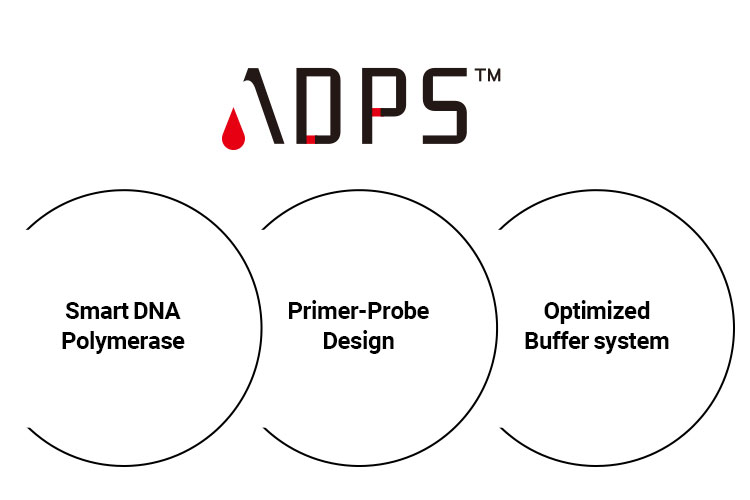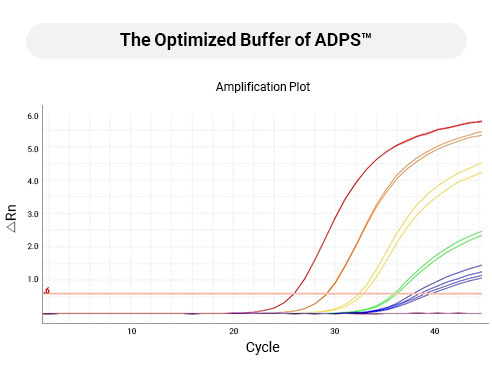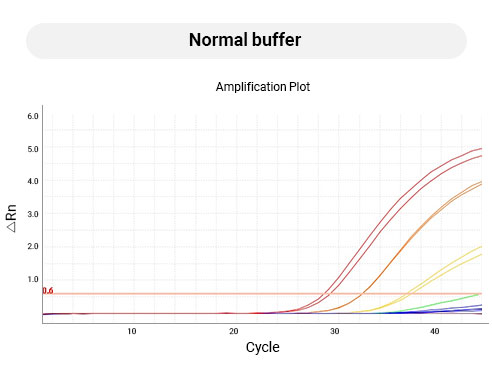What is ADPS™?
ADPS™ is a novel liquid biopsy technology that can analyze cancer mutations with ultra-high detection sensitivity.
ADPS™ (allele-discriminating priming system) is a qPCR-based new cancer diagnostic technology that analyzes cancer genes with a high detection sensitivity of up to 0.0001% (3/3,000,000), through selective amplification of cancer genes without affecting normal genes. However, the actual diagnostic sensitivity is set to 0.01%, considering the low amount of input DNA from real clinical fields. It can be used in both liquid and tissue biopsies of first stage cancer diagnosis and residual tumor monitoring.
The ADPS™ platform includes three unique sub-technologies.
The key component of ADPS™ is the smart DNA polymerase, which can detect a single nucleotide mismatch and thus selectively amplify the mutant genes only while leaving wild-type genes intact. The performance of smart DNA polymerase can be maximized with an optimized primer-probe design and buffer system.
Optimized for ctDNA liquid biopsy with ultra-high detection sensitivity, ADPS™ can analyze cancer genes with a MAF (mutant allele fraction) of 0.01%.
Click "How does ADPS™ achieve ultra-high detection sensitivity?" For more information about ADPS™ smart DNA polymerase


Primer-probe design technology for accurate cancer gene detection
GENECAST has developed its own primer design principles, specifically regarding primer length and primer Tm calculations, that allow the ADPS™ smart DNA polymerase to distinguish between wild type and mutated genes using qPCR. The ADPS primer-probe system is designed to effectively detect various genetic mutations, including SNVs (single nucleotide variants), insertions, deletions, and rearrangements.
Reaction buffer that optimizes performance of ADPS™ smart DNA polymerase
The optimized reaction buffer of ADPS™, developed by GENECAST, is designed for a minimum detection limit of 3 copies, and is optimized for pH, monovalent/divalent ion concentration, and PCR enhancer. This sets the LoD of ADPS™ to 3 copies optimized for a 0.01% detection sensitivity.


| FAM | L858R mutant (copies) |
gDNA (copies) |
|---|---|---|
| Red | 30,000 | 0 |
| Orange | 3,000 | 27,000 |
| Yellow | 300 | 29,700 |
| Green | 30 | 29,970 |
| Blue | 3 | 29,997 |
| Black | 0 | 30,000 |
Notable features of ADPS
ADPS™ is GENECAST’s proprietary liquid biopsy platform that can accurately detect various cancer genes even with only a primer-probe design.
These 10 strengths of ADPS™ will herald a new era of cancer diagnostics with the following features:
1.An ultra-high detection sensitivity up to 0.0001% guarantees a detection sensitivity of 0.01% in clinical fields. 2.Accurate diagnosis requires only a single tube of blood. 3.Short turnaround time of 2 hours 30 minutes from DNA extraction to result. 4.Cost-effective platform that does not requires expensive equipment. 5.High concordance rate between tissue and liquid biopsy. 6.Various genetic modifications (SNV, Indel, and gene fusion) can be detected. 7.Heterogeneity analysis of ctDNA is available. 8.Precision medicine/personalized medicine can be realized. 9.Expandable for various clinical PCR platforms requiring nucleotide discrimination. 10.Can be used in both tissue and liquid biopsies.